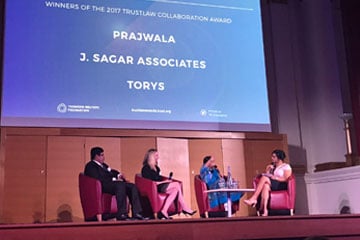
Torys has won a global pro bono award for its work with Prajwala, an anti-trafficking non-profit, to stop the distribution of images and videos of sexual violence in India.

Torys LLP has won a global pro bono award for its work with Prajwala, an anti-trafficking non-profit, to stop the distribution of images and videos of sexual violence in India.
The 2017 TrustLaw Awards, presented in London, UK on September 28, are an annual celebration of pro bono work, organized by the Thomson Reuters Foundation (Thomson Reuters is also the publisher of Legal Feeds.)
“It was really exciting, it was a fantastic project to be involved with,” says Lara Guest, an associate at Torys who was involved with the project with a team of lawyers at Torys and attended the awards in London last week. “Attending the award itself was quite a fascinating experience because you really saw firsthand how much work is going on on an international level with all these sorts of issues. It is really neat the way the TrustLaw Foundation is able to connect various NGOs and countries to work on these global level projects in a way that meets the needs of the NGOs and gives the law firms the opportunity to contribute.”
David Wawro, Jaclyn Leader, Molly Reynolds, Andri Shchudlo and Hilary Brown prepared briefs of law with Guest and submitted to the Supreme Court of India as part of the pro bono work. The briefs supported an application by Prajwala, an anti-human trafficking non-profit in India, seeking a remedy to prevent videos of sexual assault and child pornography from being displayed on social media and search engines.
The Indian Supreme Court gave Prajwala one week to submit briefs describing the legal tools available in other countries to remove this kind of content. After the Torys team helped prepared a brief on Canadian and American legal tools and remedies, the court directed a special committee to create a mechanism to prohibit the distribution of such harmful content.
“There is progress made but the exact nature of what that solution will be is not yet determined,” says Guest. “The fact that this is a global issue that all countries are struggling with, the manner in which the Indian Supreme Court decides to deal with this will be interesting from a global perspective.”
Torys was awarded the “Collaboration Award” along with the Indian firm J. Sagar Associates and Prajwala.
Click here to see a video about the project.
The legal case came about originally when Sunitha Krishnan, the founder of Prajwala, discovered a number of websites and online material that involved the sexual exploitation of children.
Krishnan had started a “Shame the Rapist” campaign in India, exposing the identity of the perpetrators, and organized a series of events to gain national recognition about the widespread presence of sex crime videos on social media. She eventually made a number of requests to the Supreme Court of India, including the establishment of a central investigative body that would specialize in cases involving videos of sexual violence, and the creation of a mechanism to allow citizens to submit anonymous reports on such videos without automatically becoming plaintiffs.
Krishnan also called for search engines and social media networks to be held responsible for the policing and removal of abusive sexual content circulated on their channels.
India’s top court then scheduled a hearing requesting the presence of leading tech companies including Google, Microsoft, Facebook and Yahoo, and gave Prajwala one week to find out how other countries have addressed this issue, which was when Torys was asked by TrustLaw to get involved.
“We actually do a number of projects with TrustLaw,” says Guest. “We have a good relationship with them, they contacted us about this relatively urgent project. It was a really great opportunity for us to work as a team both from our New York and Toronto offices and with the students that work at our office as well.”